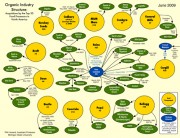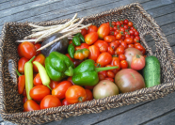 The idea of restaurants “leasing” farmland from local farmers for certain produce items is not new but may be something for our Charlotte area restaurants to consider. One of the stumbling blocks in restaurant supported agriculture (RSA), where food businesses buy from local farmers for resale, is the forecasting that farmers must do at planting times throughout the year. They have to use data from previous years and increase their intended yields based on estimated future sales. There is a lot of risk and unpredictability for the local farmers around Charlotte. Sometimes when food businesses ask farmers to grow a certain amount of food with a promise to buy it four months later at harvest time, the promises are broken and farmers can be left without much-needed sales.
The idea of restaurants “leasing” farmland from local farmers for certain produce items is not new but may be something for our Charlotte area restaurants to consider. One of the stumbling blocks in restaurant supported agriculture (RSA), where food businesses buy from local farmers for resale, is the forecasting that farmers must do at planting times throughout the year. They have to use data from previous years and increase their intended yields based on estimated future sales. There is a lot of risk and unpredictability for the local farmers around Charlotte. Sometimes when food businesses ask farmers to grow a certain amount of food with a promise to buy it four months later at harvest time, the promises are broken and farmers can be left without much-needed sales.
Restaurants Can Reduce Farmer Risk
One of the interesting and high-impact ways restaurants can help local farmers and get great food to their customers at the same time is to help farmers reduce the risk of losing future sales. We think it would be great for restaurants to provide secured future sales to local farmers in exchange for foods that chefs would like to have in their kitchens. The idea is not simple but can be done.
If a restaurant(s) offered to “lease” a certain amount of land from local farmers to grow certain things in certain quantities, farmers might feel more comfortable dedicating a portion of their growing space for this transaction. We will throw in a word of caution here:
Restaurants Plus a CSA Offer Farmers Low Risk
 There is also an even more secure way for both restaurants and farmers to accomplish this mutually beneficial restaurant supported agriculture. Know Your Farms CSA could act as a backup for these guaranteed crops so restaurants could request a whole row of produce but only have to use less than the whole row if things changed in the future. Our goal is to protect the farmers from negative impacts of this kind of change. It also gives chefs a safety net with their credibility with the farmers so if they do fall short of their purchase estimates, the excess will still be purchased from the farmer by the CSA. We hope both parties will want to begin a dialogue about how to use our CSA as a safety net to facilitate the connection between restaurants and farmers.
There is also an even more secure way for both restaurants and farmers to accomplish this mutually beneficial restaurant supported agriculture. Know Your Farms CSA could act as a backup for these guaranteed crops so restaurants could request a whole row of produce but only have to use less than the whole row if things changed in the future. Our goal is to protect the farmers from negative impacts of this kind of change. It also gives chefs a safety net with their credibility with the farmers so if they do fall short of their purchase estimates, the excess will still be purchased from the farmer by the CSA. We hope both parties will want to begin a dialogue about how to use our CSA as a safety net to facilitate the connection between restaurants and farmers.












RSS
Facebook
Twitter
Google +1
LinkedIn
Youtube
Pinterest